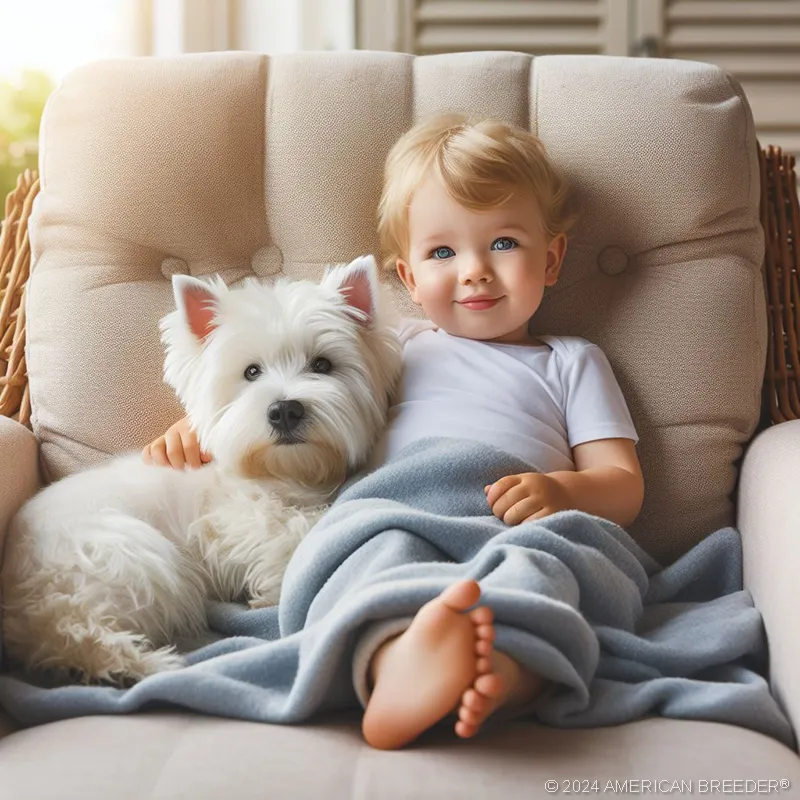Journey into the World of Westies: Everything You Need to Know
Introduction to the West Highland White Terrier Dog
 Welcome to the captivating world of the West Highland White Terrier, a breed that encapsulates charm, energy, and companionship like no other. From their engaging demeanor to their storied history, these dogs have won the hearts of dog lovers worldwide. As you delve into this guide, you'll uncover the multifaceted aspects that make the Westie a beloved and unique breed.
Welcome to the captivating world of the West Highland White Terrier, a breed that encapsulates charm, energy, and companionship like no other. From their engaging demeanor to their storied history, these dogs have won the hearts of dog lovers worldwide. As you delve into this guide, you'll uncover the multifaceted aspects that make the Westie a beloved and unique breed.
Breed Background and History
Origin and Development of the West Highland White Terrier
The roots of the West Highland White Terrier can be traced back to the rugged terrains of Scotland. Originally bred for hunting small game, their white coats allowed them to stand out in the field while showcasing their determination and agility. Over centuries, their role evolved from hunters to cherished companions, a transition that highlighted their adaptability and charm.
Historical Significance and Cultural Relevance
The Westie's journey is intertwined with Scottish history and culture. Their role as working dogs in the Scottish countryside solidified their place in the hearts of locals. As the breed gained popularity beyond Scotland, their distinctive appearance and spirited personality made them endearing icons across borders.
Purpose and Original Use of the Breed
The West Highland White Terrier's original purpose as a skilled hunter speaks to their tenacity and intelligence. Their ability to navigate challenging terrains while pursuing prey showcased their remarkable problem-solving skills. This background still influences their behavior today, making them alert and quick to react.
Kennel Clubs that Classify, Group, or Register the West Highland White Terrier
The West Highland White Terrier was recognized by kennel clubs as a distinct breed with unique attributes. These clubs not only provide a platform to celebrate the breed's characteristics but also ensure that breed standards are maintained through careful breeding practices. The breed's classification reflects their qualities and history, highlighting their place in the dog world.
Appearance of the West Highland White Terrier Dog
 Size, Weight, Activity Level, and Physical Appearance
Size, Weight, Activity Level, and Physical Appearance
Compact yet sturdy, Westies exude a confident aura in their small frames. Their size makes them adaptable to various living spaces, from apartments to larger homes. With an ideal weight range that balances their size, Westies are ready to join you in all kinds of activities, from leisurely strolls to spirited play sessions.
Coat Type, Color Variations, and Patterns
The West Highland White Terrier's distinctive white double coat is a hallmark of the breed. Designed to protect them from harsh weather conditions, their outer coat is coarse and straight, while their undercoat offers insulation. Their pure white color is not only eye-catching but also serves a functional purpose, helping them stand out during hunting pursuits.
Distinctive Features or Markings
Beyond their coat, Westies boast a set of captivating features that define their look. Their erect, pointy ears, dark, intelligent eyes, and black nose create an expressive face that beautifully reflects their emotions. A proud carriage and a wagging tail add to their charismatic appearance, making them an irresistible sight.
Average Litter Size for West Highland White Terriers
Understanding the breed's typical litter size sheds light on their reproductive patterns. Westies usually have a moderate litter size, reflecting their heritage as terriers. Responsible breeding practices aim to maintain the health and well-being of both the mother and the puppies, ensuring a smooth start for the newest members of the Westie family.
These enhancements aim to provide a more comprehensive understanding of the West Highland White Terrier Dog's attributes, history, and significance. Please let me know if you'd like to continue enriching the subsequent chapters in a similar manner.
Temperament and Personality of the West Highland White Terrier Dog
 Typical Temperament Traits and Behavior Tendencies
Typical Temperament Traits and Behavior Tendencies
The West Highland White Terrier's temperament is a delightful blend of confidence, intelligence, and affection. Known for their lively nature, they carry themselves with an air of self-assuredness that is endearing. Their boldness is matched by their friendliness, making them wonderful companions for families and individuals alike.
Energy Levels and Activity Requirements
The Westie's energy levels reflect their terrier heritage. They possess a natural curiosity and a penchant for exploration that demands mental and physical stimulation. Regular playtime, walks, and engaging activities are essential to satisfy their need for exercise, keeping them content and preventing boredom-related behaviors.
Compatibility with Different Lifestyles and Family Dynamics
Adaptable and versatile, Westies thrive in various living situations. Their size makes them suitable for apartment living, provided they receive ample exercise and mental enrichment. Families, couples, and singles all find joy in their company, as long as their need for social interaction and activity is met.
List of Typical Behavior Issues
While Westies are wonderful companions, it's important to address potential behavior challenges. Their inherent curiosity can lead to digging and exploring, so providing designated play areas and mental enrichment can curb these tendencies. Separation anxiety can arise if left alone for extended periods, emphasizing the need for gradual training and companionship-building.
Trainability and Intelligence of the West Highland White Terrier Dog
Trainability Level and Ease of Learning
Westies possess an intelligent and eager-to-please nature that aids in their trainability. Their quick understanding of commands and desire to impress their owners contribute to effective training sessions. However, their inherent independence may occasionally lead to a touch of stubbornness, requiring patient and consistent training techniques. Willingness to Please Their Owner
Willingness to Please Their Owner
A Westie's devotion to their owner is a cornerstone of their personality. They genuinely want to make their humans happy and thrive on positive reinforcement. Building a strong bond through training not only imparts essential skills but also strengthens the emotional connection between dog and owner.
Intelligence and Problem-Solving Abilities
Their intelligence extends beyond basic commands—Westies excel at problem-solving tasks. Engaging their minds with puzzles and interactive toys not only wards off boredom but also showcases their cognitive prowess. Mental stimulation complements physical exercise, contributing to their overall well-being.
Recommended Training Approaches and Techniques
Positive reinforcement training methods are particularly effective with Westies. Reward-based training builds their confidence and fosters a harmonious relationship between owner and dog. Consistency, patience, and clear communication are key when guiding them through various commands and behaviors.
Training or Skills Best Suited for West Highland White Terriers
Westies shine in activities that tap into their natural talents. Agility training allows them to showcase their agility and problem-solving abilities, while obedience training hones their responsiveness. Engaging in activities that challenge their intellect and physical capabilities keeps them fulfilled and content.
These extended insights aim to provide a more comprehensive understanding of the West Highland White Terrier Dog's temperament, trainability, and intelligence. Should you wish to continue, I'm here to enrich the subsequent chapters as well.
Practical Considerations for Owning a West Highland White Terrier Dog
Size of Sleeping Quarters Depending on Size
Considering your Westie's size is essential when creating a comfortable sleeping space. A cozy dog bed that provides support for their joints is ideal. Place the bed in a quiet and draft-free area, ensuring they have a peaceful retreat to rest after their active days. Typical Annual Veterinary Cost
Typical Annual Veterinary Cost
Budgeting for your Westie's healthcare is crucial. Annual check-ups, vaccinations, and preventive medications ensure their well-being. While costs can vary based on location and specific needs, investing in their health through regular vet visits is a long-term commitment worth making.
Type of Grooming and Annual Cost
Westies' coats demand regular care to maintain their appearance and health. Regular brushing not only removes loose hair but also prevents matting. Professional grooming sessions every few months help maintain their distinctive appearance, contributing to their overall well-being and hygiene.
Daily Exercise Needs and Requirements
Meeting your Westie's exercise needs is vital for their physical and mental health. Engaging in daily walks, interactive play, and mental enrichment activities keeps them content and prevents behavioral issues. Their terrier instincts thrive when they can explore and engage with their environment.
Level of Playfulness
Westies are inherently playful, and their spirited nature is infectious. Interactive toys, fetch sessions, and games of hide-and-seek are all ways to channel their energy and foster a strong bond between you and your furry companion.
 Level of Intelligence
Level of Intelligence
Their intelligence contributes to their adaptability and problem-solving skills. Providing puzzles, treat-dispensing toys, and training sessions challenges their minds and keeps them entertained.
Affection Level and Desired Attention
Westies thrive on human interaction and affection. Their desire to be close to their owners makes them wonderful lap dogs. Regular cuddles and quality time together strengthen the emotional bond between you and your Westie.
Friendliness Toward Strangers
While Westies are generally friendly, their cautious nature might lead to some initial skepticism towards strangers. Early socialization and positive experiences with new people can help them become more open and approachable.
Grooming Needs and Frequency
Maintaining their iconic white coat requires regular grooming. Brushing two to three times a week helps prevent mats and tangles, while professional grooming every few months ensures their coat remains clean and presentable.
Feeding Requirements and Dietary Considerations
Providing a balanced diet tailored to your Westie's age, size, and activity level is essential for their overall health. High-quality dog food, portion control, and consulting your veterinarian for dietary recommendations contribute to their well-being.
Health and Care of the West Highland White Terrier Dog
 Common Health Issues or Predispositions of the West Highland White Terrier
Common Health Issues or Predispositions of the West Highland White Terrier
While generally healthy, Westies are prone to certain genetic health issues. Conditions such as skin allergies, hip dysplasia, and dental problems can arise. Regular veterinary check-ups and preventive measures help manage their health and catch any potential issues early.
Allergies and Specific Dietary Considerations
Some Westies may develop allergies, often related to their skin or diet. Identifying and managing allergens, along with consulting a veterinarian, helps keep their skin and coat healthy.
Lifespan and Longevity Expectations
Westies typically enjoy a lifespan of 12 to 16 years. Providing proper care, nutrition, and regular exercise contributes to their longevity, allowing them to be cherished companions for many years.
Grooming Requirements Based on Coat Type and Size
Grooming routines vary based on the specific needs of your Westie's coat. Regular brushing, ear cleaning, and nail trimming are essential components of their care routine, contributing to their overall health and appearance.
Exercise Needs and Recommendations for Physical and Mental Stimulation
Satisfying their exercise needs involves a combination of physical activities and mental stimulation. Engaging in play, daily walks, and interactive games not only keeps them physically fit but also prevents boredom-related behaviors.
Nutrition and Feeding Guidelines
Feeding your Westie a balanced diet ensures their overall health and well-being. Consult your veterinarian for personalized dietary recommendations, portion sizes, and feeding schedules that align with their age, size, and activity level.
Vaccination Schedule and Preventive Care
Adhering to a vaccination schedule recommended by your veterinarian is crucial for preventing diseases. Core and non-core vaccines protect your Westie from various illnesses, contributing to their long-term health.
Regular Health Check-ups and Vet Visits
Routine health check-ups are essential for monitoring your Westie's well-being. Regular vet visits not only ensure their physical health but also provide an opportunity to address any questions or concerns you may have.
Signs of Potential Health Problems and When to Seek Veterinary Attention
Knowing the signs of potential health issues enables you to act promptly. Any changes in behavior, appetite, or physical appearance warrant a visit to the vet, ensuring timely diagnosis and treatment.
Socialization and Compatibility
Interaction with Children, Other Pets, and Strangers
Westies' friendly nature extends to their interactions with children, making them great family dogs. Proper socialization from a young age helps them develop positive relationships with children, other pets, and strangers.
 Socialization Needs and Tips for Proper Socialization
Socialization Needs and Tips for Proper Socialization
Early socialization is vital to help your Westie develop into a well-rounded adult dog. Exposure to various people, environments, and situations during their formative months builds their confidence and reduces anxiety.
Precautions or Considerations for Multi-Dog Households
Introducing a Westie to a multi-dog household requires careful management and consideration. Supervised introductions and gradual integration help foster positive relationships between dogs.
Level of Ease When It Comes to Training West Highland White Terriers
Their intelligence and eagerness to please make Westies relatively easy to train. Consistency, positive reinforcement, and patience are key elements in their training journey.
Playtime and Exercise with Other Dogs or Pets
Westies enjoy companionship, making them amiable playmates for other dogs. Engaging in group play sessions and ensuring each dog's personality is compatible contributes to harmonious interactions.
Dog-Friendly Activities and Outings
Westies relish outings and activities that involve human interaction and exploration. Beach trips, hiking, and even canine sports like agility or obedience training offer engaging experiences for both dog and owner.
The provided enhancements aim to offer more detailed insights into the West Highland White Terrier Dog's practical considerations, health and care, as well as socialization and compatibility. If you'd like to continue enriching the subsequent chapters, please let me know.
Living Arrangements and Environment
 Suitability for Different Living Arrangements
Suitability for Different Living Arrangements
The West Highland White Terrier's adaptable nature makes them suitable for various living arrangements. Whether you reside in an apartment, a house, or a rural area, their size and energy level allow them to thrive in different environments.
Space Requirements and Exercise Options
While Westies can adapt to smaller spaces like apartments, they do need regular exercise to stay healthy and happy. Daily walks, interactive play sessions, and access to a secure yard offer them the physical and mental stimulation they need.
Climate Considerations and Adaptability
Their double coat provides insulation against various weather conditions, but it's important to consider their comfort in extreme temperatures. In colder weather, providing them with a cozy blanket or sweater can help keep them warm.
Recommended Yard Size for the West Highland White Terrier
If you have a yard, ensuring it's properly fenced and secure allows your Westie to explore and play safely. While they don't need a massive yard, having a space where they can run and investigate is beneficial.
Ideal Living Conditions and Environment
Westies thrive in environments where they receive plenty of attention and mental stimulation. A loving family, interactive toys, regular exercise, and cozy spaces to rest are essential components of their ideal living conditions.
Training and Obedience
 Basic Obedience Training and Commands
Basic Obedience Training and Commands
Starting with basic commands like sit, stay, and come lays the foundation for effective communication. Positive reinforcement techniques and consistent training sessions foster their willingness to learn and please their owners.
Advanced Training or Specialized Activities
Westies' intelligence and versatility make them capable of excelling in various advanced training and activities. From agility to scent work, their eagerness to engage ensures they enjoy new challenges and accomplishments.
Behavioral Challenges or Specific Training Considerations
Addressing potential behavior challenges, such as barking or digging, requires patience and positive reinforcement. Redirecting their instincts through training and offering suitable outlets for their energy helps manage such behaviors.
House Training and Potty Training Tips
Effective house and potty training require a routine and clear communication. Consistency, positive reinforcement, and recognizing their cues contribute to successful training outcomes.
Leash Training and Walking Etiquette
Leash training helps your Westie walk calmly beside you. Teach them to walk on a loose leash, and encourage good walking etiquette by rewarding desired behaviors.
Exercise and Activities
Daily Exercise Needs and Recommendations
Engaging in physical activities is essential to keep your Westie healthy and happy. Regular exercise prevents obesity and boredom-related behaviors while strengthening the bond between you and your dog.
Mental Stimulation Activities and Games
Incorporating mental stimulation into their routine is equally important. Puzzle toys, interactive games, and scent-based activities engage their minds and prevent them from becoming restless.
Exercise Routines and Activity Ideas
Variety is key when designing their exercise routine. Rotate between walks, playtime, and different activities to keep them engaged and prevent them from getting bored.
Energy Outlets for High-Energy Breeds
For high-energy Westies, engaging in activities like agility, fetch, and even simple obedience training can channel their energy productively. Mental and physical stimulation are essential to keeping them content.
Financial Planning for Owning a West Highland White Terrier Dog
 Typical Price Range for Purchasing from Reputable Breeders
Typical Price Range for Purchasing from Reputable Breeders
The cost of purchasing a Westie from a reputable breeder varies based on factors like pedigree, lineage, and breeder reputation. Be prepared to invest in a responsible source that prioritizes the breed's health and well-being.
Initial Costs
Beyond the purchase price, consider initial costs like adoption fees, vaccinations, spaying/neutering, and microchipping. These upfront expenses ensure your Westie starts their journey in the best possible way.
Ongoing Expenses
Owning a Westie comes with ongoing expenses like high-quality dog food, regular vet visits, grooming, training, toys, and preventive medications. Proper budgeting ensures you can provide consistent care.
Pet Insurance or Budgeting for Unexpected Medical Costs
While not mandatory, pet insurance can offer peace of mind in case of unexpected medical emergencies. Alternatively, setting aside funds for potential medical costs ensures you can provide necessary care without financial strain.
Options for Pet Care During Vacations or Travel
Planning for pet care during vacations or travel is crucial. Options range from professional pet sitters, boarding facilities, or entrusting their care to a trusted friend or family member.
Conclusion
Summary of Key Information and Considerations for the West Highland White Terrier Dog
Reflect on the comprehensive journey you've embarked upon to understand the West Highland White Terrier. From their origins and characteristics to health care and responsible ownership, this guidebook provides a holistic view of what it means to share your life with this charming breed.
Encouragement to Continue Learning and Seeking Expert Guidance
As you navigate your journey with a Westie, remember that learning is a continuous process. Seek guidance from experts, trainers, and experienced owners to enhance your understanding and enrich your bond with your furry companion.
Emphasis on Responsible Ownership, Commitment, and Providing a Loving, Suitable Home for a Dog
Owning a West Highland White Terrier is a privilege that comes with great responsibility. Your commitment to their well-being, health, and happiness plays a pivotal role in their quality of life. Providing a safe, loving, and suitable home is the cornerstone of responsible ownership.
Final Thoughts
Through this guide, you've gained insights into the West Highland White Terrier's history, temperament, care, training, and more. This breed offers endless joy, companionship, and adventure. As you embark on this journey, remember that each Westie is unique, and understanding their individual needs and quirks will help you build a strong and lasting bond.
Whether you're a first-time owner or an experienced enthusiast, the West Highland White Terrier's unwavering loyalty, affectionate nature, and undeniable charm are sure to captivate your heart. As you continue to explore the world of Westies, may your journey be filled with laughter, love, and the endless companionship of this remarkable breed.
West Highland White Terrier Dog Quick Reference Guide
Breed Background: Origin: Scotland | Breed Purpose: Small Game Hunter | AKC Class: Terrier | Year Recognized by AKC: 1908 Appearance: Size: Small | Weight: 15-20 pounds | Coat Type: Double coat | Colors & Patterns: White | Distinctive Features: Pointed ears, bushy tail
Appearance: Size: Small | Weight: 15-20 pounds | Coat Type: Double coat | Colors & Patterns: White | Distinctive Features: Pointed ears, bushy tail
Temperament: Energy Level: 4 | Friendliness to Pets: 3 | Friendliness to Strangers: 3 | Trainability: 3 | Playfulness: 4 | Frequent Barker: 3 | Chase Instincts: 4 | Sense of Smell: 4 | Drive to Hunt: 5
Health & Care: Health Issues: Skin allergies, patellar luxation | Lifespan: 12-16 years | Grooming Difficulty: Moderate | Exercise Needs: Moderate
Socialization: Interaction with Children: Good, but supervise young kids | Interaction with Pets: Can be selective | Interaction with Strangers: Cautious | Ease of Training: Moderate
Suitable Living Arrangements: Apartment: Yes | House: Yes | Rural Area: Yes | Yard Size Requirements: Small yard is sufficient
Training & Obedience: Trainability: 3 | Intelligence: 3 | Obedience: 3 | Problem-Solving: 3 | Easily Stimulated: 4 | Focus Level: 3 | Easily Distracted: 3
Financial Planning: Typical Price Range: $800 - $1,500 | Initial Expenses: Puppy essentials, training | Ongoing Annual Expenses: Food, grooming, veterinary care
Breeding: Reproductive Maturity: 6-8 months | Litter Frequency: 1-2 litters per year | Litter Size: 3-5 puppies | Stud Cost: Varies widely | Breeding Challenges: Birthing difficulties can occur
